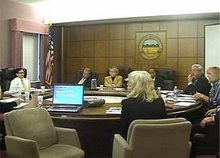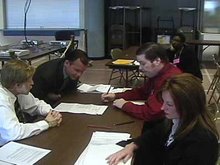Thursday, March 29, 2007
Dangerous Irony: Proofing Paper Ballots in an Electronic World
Yesterday, I posted the CCBOE media release inviting citizens, by Ohio law, for today's 24 hour proofing period of the ballots for the next, May's election. Late this afternoon I went.
I, like most board employees and managers I observed during the chaos of scanning the absentee ballots last November, got dazed by the enormity of the poorly set out task and the confusion and forgot the ultimate purpose of why I was there - to PROOF ballots that are to be used in the next election to make sure they are correct.
It was not until I got home that I realized the irony - the really dangerous irony - of having citizens review and proof paper ballots in an effort to facilitate transparency, when in Cuyahoga voting is done on a $20+ million electronic system.
Just as with any Microsoft Word document we create, we all know that there is lots of computer code that exists within the document - codes that create the formatting styles, the fonts, the colors, the tab widths, paragraphs, etc. - but this code is not revealed on a print out of the document.
There is the same kind of code inside the electronic ballots {Ballot Definition File (BDF)}, that we use when we vote on a touchscreen voting system. And that code inside the BDF, if improperly configured - negligently, incompetently, or purposefully - could possibly affect election results, as was investigated in Florida's 2006 HR13 election (Congressional race) where an unusually high number of undervotes were discovered.
In addition to all the other major factors that demand we must get rid of electronics in citizen elections, such as soaring costs; multi-vector security holes that also easily allow insider riggability and anyone's hackability; the operational unreliability; and counting secrecy - now to truly be able to proof our ballots, we need to get digital copies of all the ballot styles, which in Cuyahoga countywide elections can number up to 1400, and which show the underneath codes. Then we need independent computer experts, along with regular English text proofreaders, and those familiar with the candidates and issues to do the proofing together.
As long as we have DRE's, which I hope is not long at all, no less is sufficient.
I, like most board employees and managers I observed during the chaos of scanning the absentee ballots last November, got dazed by the enormity of the poorly set out task and the confusion and forgot the ultimate purpose of why I was there - to PROOF ballots that are to be used in the next election to make sure they are correct.
It was not until I got home that I realized the irony - the really dangerous irony - of having citizens review and proof paper ballots in an effort to facilitate transparency, when in Cuyahoga voting is done on a $20+ million electronic system.
Just as with any Microsoft Word document we create, we all know that there is lots of computer code that exists within the document - codes that create the formatting styles, the fonts, the colors, the tab widths, paragraphs, etc. - but this code is not revealed on a print out of the document.
There is the same kind of code inside the electronic ballots {Ballot Definition File (BDF)}, that we use when we vote on a touchscreen voting system. And that code inside the BDF, if improperly configured - negligently, incompetently, or purposefully - could possibly affect election results, as was investigated in Florida's 2006 HR13 election (Congressional race) where an unusually high number of undervotes were discovered.
In addition to all the other major factors that demand we must get rid of electronics in citizen elections, such as soaring costs; multi-vector security holes that also easily allow insider riggability and anyone's hackability; the operational unreliability; and counting secrecy - now to truly be able to proof our ballots, we need to get digital copies of all the ballot styles, which in Cuyahoga countywide elections can number up to 1400, and which show the underneath codes. Then we need independent computer experts, along with regular English text proofreaders, and those familiar with the candidates and issues to do the proofing together.
As long as we have DRE's, which I hope is not long at all, no less is sufficient.
Subscribe to:
Post Comments (Atom)






No comments:
Post a Comment